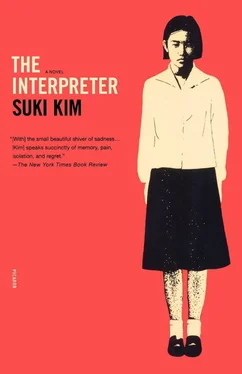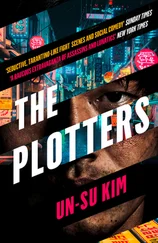It is useless to pretend with an old friend. Yet there are things one should never say aloud, never admit. So, instead, Suzy says with forced clarity, “But they’re both dead; it’s been five years.”
“Five years, but you’re still hiding,” Jen mutters slowly.
“Not any more than what you’re doing here with me,” says Suzy, changing the subject.
Jen is smiling now. The first real smile since she got here. “Decaf sucks, doesn’t it?”
“It was your idea.” Suzy puts down the cup, which has gotten tepid too quickly. “So you still have to go back to the office?”
“Yeah. The issue ships tomorrow, and Harrison still hasn’t faxed in his corrections.”
“The control-freak writer?”
“More like the pain-in-the-ass writer. If he didn’t have such a stunning mind, we would’ve severed our ties with his last piece, which came in three months late.”
“What’s this one about?”
“Nabokov. The pre -Lolita years, when he was teaching at Cornell. Harrison was one of his students then and makes a case about how Nabokov had hated America, and, even worse, how he despised writing in English. Harrison claims that Lolita was really a metaphor for how Nabokov felt toward the English language. The strange mix of desire, subjugation, remorse. It’s an interesting theory, although I’m not sure how much of it I really buy. Nabokov wrote in English almost exclusively, you know. Once he moved here in the forties, he dropped his native Russian, which was a peculiar decision. But he’d been raised trilingual—English, French, and of course Russian. As far as I can tell, he was at ease with all three languages. The man ended up retiring to Switzerland, of all places, talk about neutral ground! They only okayed this article because it’s controversial, and of course because it’s Harrison. He even claims that Nabokov’s decision to adopt American citizenship was little more than a pretext, that it gave him cover for his anti-Americanism. It happened in 1945, not exactly an innocent year. It offers a totally new reading of Lolita . I’m not convinced, though.” Jen turns to her, knitting her eyebrows. “Does it mean all that much? What does it mean to adopt a new citizenship?”
American citizenship. Of course, Suzy, having come to America at five, had to have become a naturalized citizen at some point. The question rarely came up. She has never even applied for a passport. The idea of flying seized her with vertigo, but in reality, the opportunity never arose. Damian talked about their taking a trip together, since his research often took him to Asia. But it soon became obvious that he did not want her along on his trips. Without a passport, nothing proves her citizenship. She has always checked off the “citizen” box on financial-aid forms, because she once asked Mom and was told that she was a citizen. Since she herself was a citizen, wouldn’t her parents and Grace be as well? When did they all become citizens? How did it happen? She was told that they had left Korea in 1975. They had followed a family member who had been living in the United States, a cousin on Mom’s side, who must have applied for their visa. When Suzy asked the whereabouts of this cousin, Mom said that she died soon after their arrival. Suzy remembers feeling bad about it. Since they had no relatives in America and had not kept in touch with anyone from Korea, an aunt nearby would’ve been nice. But as it turned out, the family had no one. When other kids boasted about visiting a grandmother or a cousin or an aunt, Suzy just shrugged. She had never had any, so she felt no terrible loss.
Contrary to their insistence on everything Korean, her parents rarely discussed their life back home. Dad had been an orphan. A war orphan, a leftover from the 38th Parallel, he used to say. He’d been all alone from birth, and yet he’d managed to get himself to the richest country in the world, so how about that!—Dad would grunt at little Suzy and Grace on nights when he downed a whole bottle of soju . On those nights, Dad seemed to forget that they were there at all. The rage they often witnessed was gone too. He seemed to be fighting the urge to remember and yet could not stop recalling the demons from his Korean past, which had nothing to do with his daughters or his wife or this faraway land, as far as the ocean, as far as the length of a decade or two decades or however long it took to call it a home, a place called Queens, a place called the Bronx, a place called America, none of which assuaged whatever stuck in his heart unturned. What Suzy saw was a kind of sorrow, so raw that it felt contagious. Had his recollections at such times signaled the seed of all his angers, she could not have known, because he would not have told, because he was a type of man who should never have had a family.
Mom, though, had not been so alone. She still had family left in Korea. Two sisters. A couple of nieces and nephews. Everyone comes from somewhere. But it seemed that something bad had happened, and she stopped talking to them years ago. When Suzy asked Mom why, she was told to stay out of the adults’ affairs. Family feud, Suzy later assumed. Probably about money—what else? Couldn’t be much money, though. Mom did not come from wealth. Suzy gathered that much.
The subculture of immigrants had nothing much to do with the rest of America. When the girls took sick, Mom would get a concoction from a local Korean pharmacy where they never asked for a prescription. When Dad lost his appetite, he would visit an herbalist in Astoria for a dose of bear’s galls. When her parents had some money they could put away, which was hardly ever, they would turn not to a bank but to a gae , which was a Korean communal-savings pool where a monthly lottery was drawn to grant the winner a lump sum. It was beyond Suzy’s understanding why her parents, like most Korean elders, preferred Maxwell House instant coffee to fresh coffee, or why they wouldn’t touch grapefruits or mangoes, though they kept boxes of dried persimmons at home. Had she stayed in just one neighborhood long enough, had she been allowed to build intimacy with one friend, one neighbor, one relative, then perhaps this perpetual Korea, which hovered somewhere in the Far East, might have seemed more relevant. She kept up with the language. She followed the custom. But knowing about a culture was different from feeling it. She would bow to the elders without the traditional respect such bows required. She would bite into the pungent spice of kimchi without tasting its sad, sour history. She would bob her head to the drumbeats of the Korean folk songs without commiserating with their melancholy. But how could she? She recalled nothing of the country.
Yet American culture, as Suzy was shocked to discover upon leaving home, was also foreign to her. Thanksgiving dinners. Eggnogs. The Mary Tyler Moore Show . Monopoly. Dr. Seuss. JFK. Such loaded American symbols meant nothing to her. They brought back no dear memory, no pull of nostalgia. Damian hailed her as the ultimate virgin. He laughed when, at one Thanksgiving dinner, he saw Suzy’s face brighten as she tried turkey covered in cranberry sauce for the first time. A blessing, he said, to be raised in such a cultural vacuum. But the blessing came with its price. Being bilingual, being multicultural should have brought two worlds into one heart, and yet for Suzy, it meant a persistent hollowness. It seems that she needed to love one culture to be able to love the other. Piling up cultural references led to no further identification. What Damian had called a “blessing” pushed her out of context, always. She was stuck in a vacuum where neither culture moved nor owned her. Deep inside, she felt no connection, which Damian seemed to have understood.
Читать дальше












